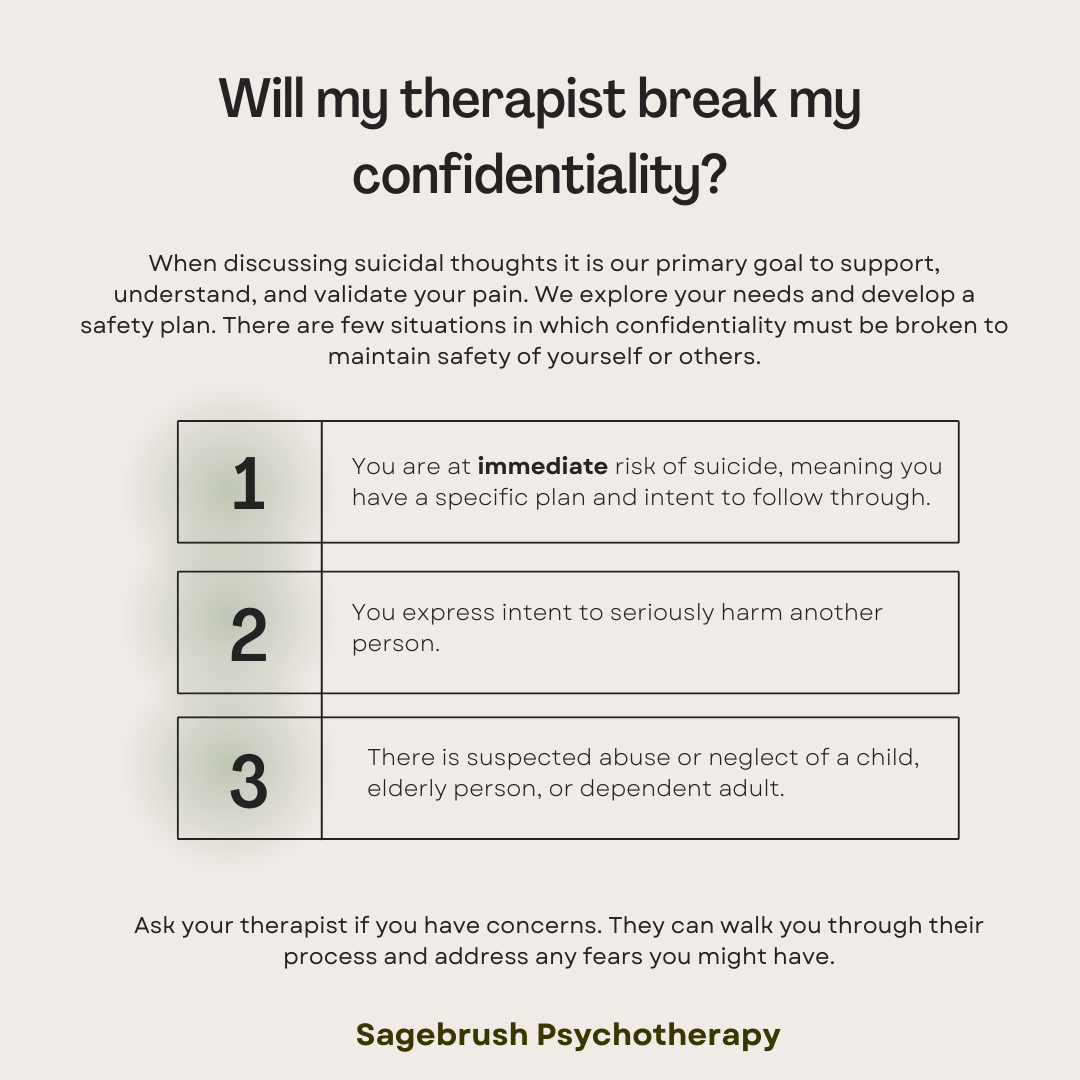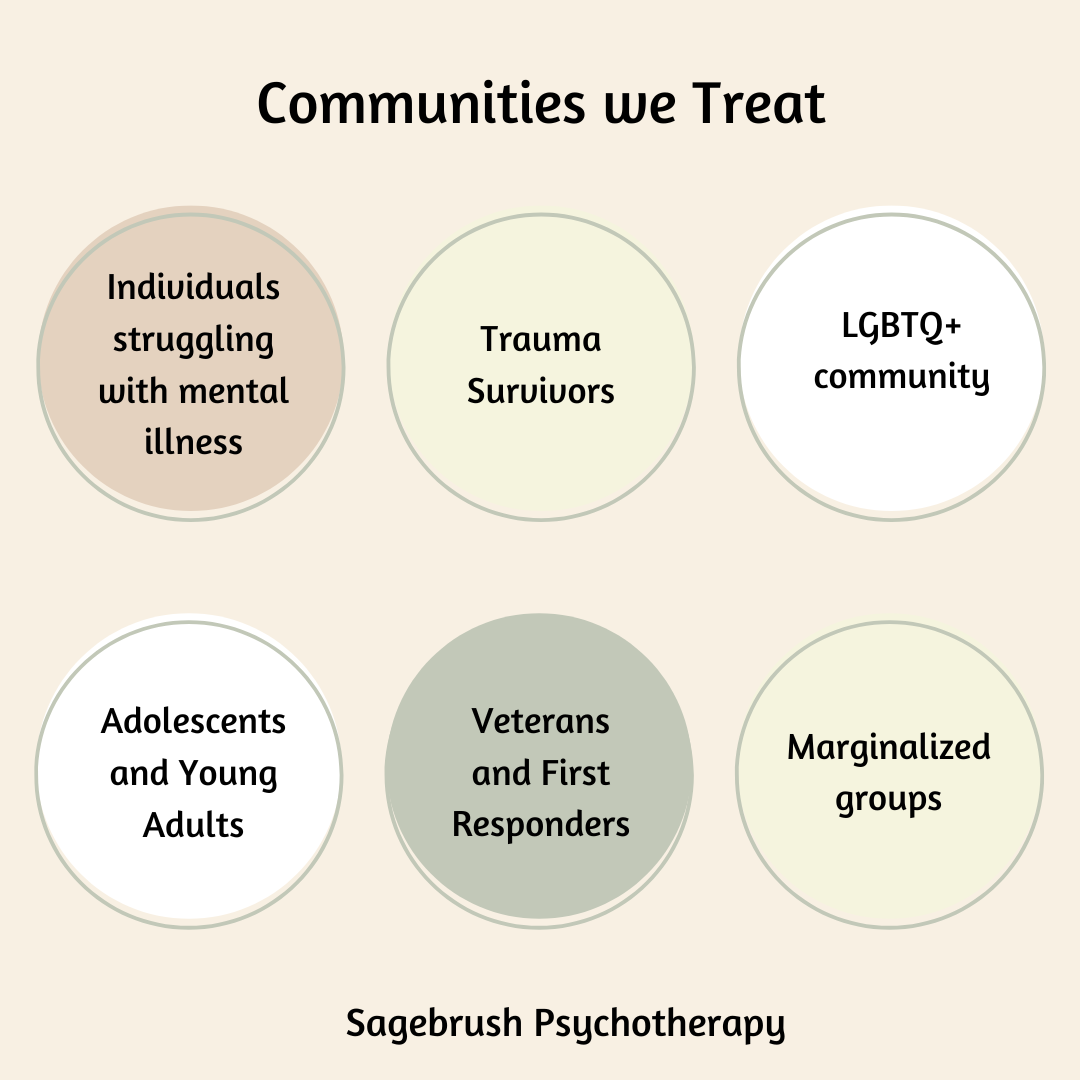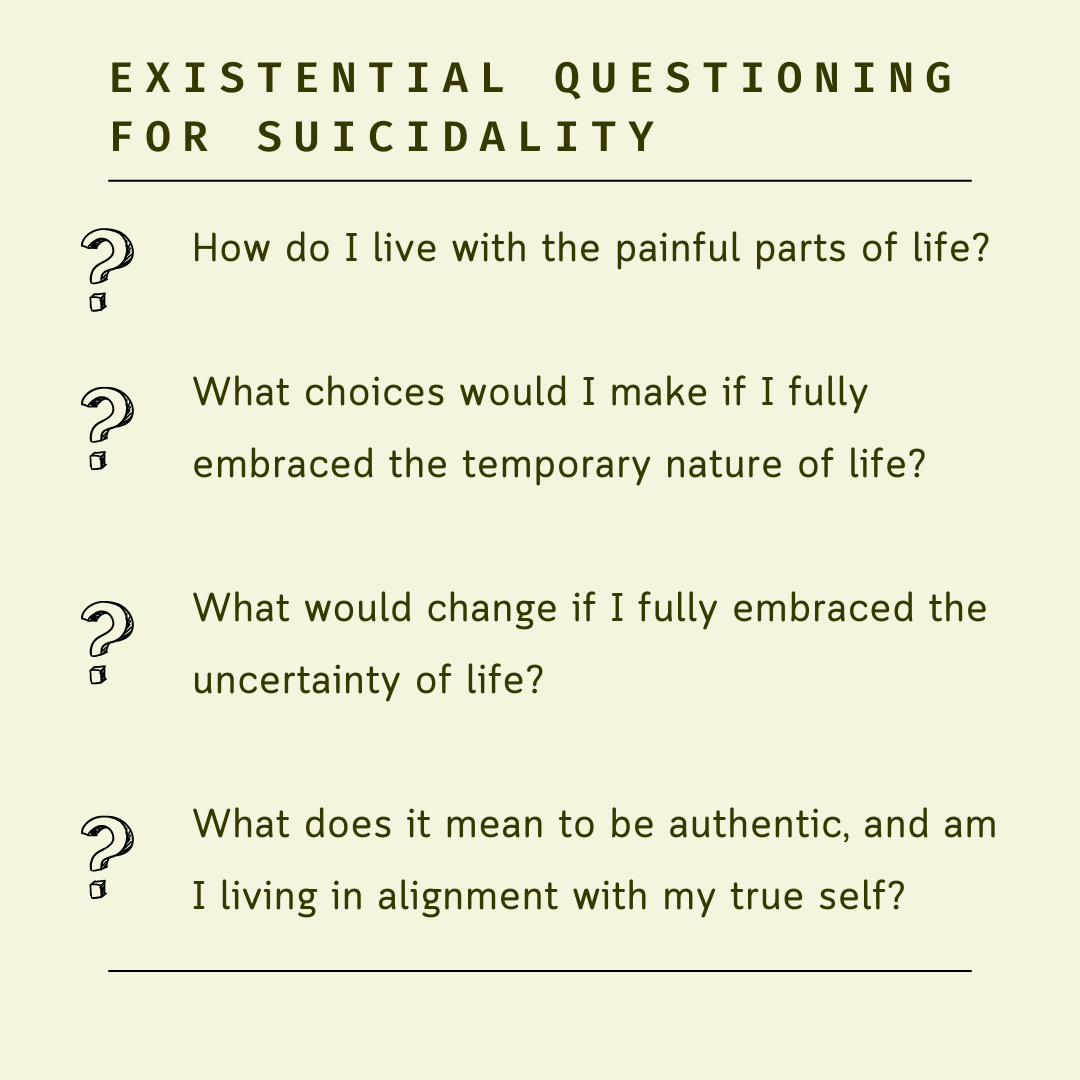Suicide Therapist in Los Angeles: Support for Suicidal Thoughts and Chronic Suicidality
On this page:
What Happens If You Tell Your Therapist You’re Suicidal?, How We Treat Suicidal Ideation, Vulnerable Populations and Risk Factors for Suicidal Thoughts, Common Triggers for Suicidal Thoughts, Chronic Suicidality, How Existential Therapy Can Help with Suicidality, Suicide Resources for Immediate Help
Therapy for Suicidal Thoughts and Chronic Suicidality
Experiencing suicidal thoughts can feel isolating and scary, especially when opening up about your thoughts feels too vulnerable. We are here for you. Therapy can help address suicidal feelings by providing a safe space to explore and understand these emotions. It can be hard to share the depth of your pain, but we are here to honor your experiences, validate your feelings, and provide support without judgment. If you’ve experienced suicidal thoughts since childhood, faced multiple attempts, or feel like these thoughts never go away, we are here to help you navigate these challenges with care, compassion, and understanding.
Why We Specialize in Treating Suicidal Patients
Addressing suicidal thoughts, especially chronic suicidality, requires specialized training and expertise. At Sagebrush Psychotherapy, we approach this work with deep care, both honoring your immense pain and working together toward a life worth living. We know that fear and stigma often surround discussions about suicidality, but we lead with understanding, not fear, creating a safe and non-judgmental space where you can explore your experiences.
Our therapists are trained in evidence-based treatments such as Dialectical Behavior Therapy (DBT) and trauma-informed care, which are designed to build emotional resilience. We focus on empowering you with tools and strategies to navigate difficult moments, address the underlying causes of your pain, and find hope even when it feels out of reach.
You deserve care that sees you fully—your pain, your strength, and your potential for healing. Together, we'll work toward reclaiming a sense of purpose, connection, and balance, allowing you to move toward a life that aligns with your values and goals. Healing is possible, and we're here to walk this journey with you.
What Happens If You Tell Your Therapist You’re Suicidal?
If you’re struggling with suicidal thoughts, you may wonder what happens if you tell your therapist. Many people worry about being hospitalized, having their confidentiality broken, or losing control over their choices. At our practice, these conversations are met with care, not crisis.
It is also important to understand that therapists have legal and ethical obligations to document and report serious risks; however, such reporting typically occurs in rare cases, only under high-risk conditions.
When you tell your therapist about suicidal feelings, our goal is to support you, not to panic. Mental health professionals are trained to help you navigate these thoughts while working with you to create a plan that prioritizes your safety and well-being.
1. A Safe Space: Mental Health Professionals Are Here to Help, Not Punish
Bringing up suicidal thoughts can be vulnerable, but your therapist will approach the conversation with understanding, not fear. This is a space for you to be honest about what you’re feeling.
Telling your therapist about suicidal thoughts does not automatically lead to hospitalization. Mental health professionals are trained to assess risk carefully and take the least restrictive approach to keep you safe.
Therapists are trained to sit with your pain—not to shy away from it. They understand that suicidal thoughts are not a personal failure but a reflection of deep emotional distress. Rather than reacting with discomfort or alarm, a therapist approaches these conversations with curiosity, validation, and a willingness to explore what your thoughts truly mean. They recognize that suicidal ideation is often a signal of unmet needs, overwhelming emotions, or a desire for change—not just a wish to die.
Your therapist is there to help you make sense of your experiences, offer alternative ways to manage distress, and guide you toward meaningful support. Therapy is a space where you don’t have to filter your pain—instead, you can explore it safely, with someone who is ready to listen, not judge.
2. A Thoughtful Risk Assessment
Your therapist will ask questions to understand the severity of your thoughts, such as:
How often do you think about suicide?
Do you have a specific plan?
Do you have access to the means to follow through?
Have you attempted suicide before?
3. When and Why Therapists Are Legally Required to Break Confidentiality
Confidentiality is a fundamental part of therapy, but there are certain situations where a therapist must break it to ensure safety. A therapist is legally required to break confidentiality if:
You are at immediate risk of suicide, meaning you have a specific plan and intent to follow through.
You express intent to seriously harm another person.
There is suspected abuse or neglect of a child, elderly person, or dependent adult.
Depending on the circumstances when reporting is required your therapist may need to contact emergency services, a crisis response team, or a trusted support person like a family member to ensure your safety. Therapists do not make this decision lightly—whenever possible, they will involve you in the process to ensure you feel heard and empowered.
4. Developing a Game Plan Together
If you are struggling with suicidal thoughts but are not in immediate danger, your therapist will work with you to create a safety plan, which may include:
Recognizing common triggers
Identifying a support network of trusted friends or family members
Coping strategies to help manage distressing thoughts
Accessing additional resources, including suicide hotlines like the National Suicide Prevention Lifeline
Reminders of your long term goals and encouragement for hope for the future
Identifying cognitive distortions that contribute to suicidal feelings
A safety plan in therapy is a personalized, structured strategy designed to help cope with suicidal thoughts, manage distress, and stay safe during moments of crisis. It is developed collaboratively between the therapist and the client to ensure that the person has a clear, actionable guide for handling suicidal ideation.
You don’t have to go through this alone. If you’re struggling with suicidal thoughts, reaching out is a courageous step, and you will be met with compassion, understanding, and a plan to help you move forward safely.
Suicidality Treatment and Support in Los Angeles – Help for Suicidal Thoughts and Chronic Suicidality
How We Treat Suicidal Ideation
Experiencing suicidal thoughts can be overwhelming. Maybe you feel ashamed or uncertain about seeking help. However, talking to your therapist is an important step in understanding what’s driving these thoughts and finding relief. At Sagebrush Psychotherapy, our therapists specialize in treating people struggling with suicidal ideation by providing compassionate, evidence-based care tailored to your unique needs.
Effective treatment can include individual therapy, group therapy, and medication management to address underlying mental health disorders. Our approach to treating suicidal ideation includes:
1. Understanding the Symptoms and Root Causes
Suicidal thoughts are often linked to mental illnesses such as depression, anxiety, PTSD, and Borderline Personality Disorder (BPD).
We work to identify the emotional, psychological, and situational factors contributing to your distress.
2. Evidence-Based Therapy
Dialectical Behavior Therapy (DBT): Helps with emotional regulation, distress tolerance, and reducing self-destructive behaviors.
Trauma-Informed Therapy: Addresses past experiences that may be influencing suicidal thoughts.
Existential Therapy: Helps you explore meaning, purpose, and values that can create a sense of hope.
3. Medication Management (If Needed)
Some mental health disorders contributing to suicidal ideation, such as major depression or bipolar disorder, may benefit from medication.
We collaborate with psychiatrists and medical providers to assess whether medication management could support your healing.
Healing from suicidal thoughts is possible with the right treatment options and support. Therapy helps you develop long-term strategies for managing distress, fostering self-compassion, and creating a life that feels meaningful.
Vulnerable Populations and Risk Factors for Suicidal Thoughts
Suicidal thoughts can affect anyone, and certain populations are more at risk to developing suicidal thoughts. Understanding the unique challenges faced by these populations is essential for providing tailored and compassionate care. Recognizing environmental stressors, social and economic contexts, and the impact of systemic inequities and personal experiences is central to our treatment approach. By addressing these factors, we strive to create a supportive space where individuals feel seen.
Individuals with Chronic Mental Health Conditions: People living with disorders such as depression, anxiety, Borderline Personality Disorder (BPD), or PTSD often experience heightened emotional distress, making them more susceptible to suicidal thoughts.
Trauma Survivors: Those who have experienced physical, emotional, or sexual abuse, neglect, or significant loss are at greater risk, as unresolved trauma can lead to feelings of hopelessness and despair.
LGBTQ+ Community: Due to stigma, discrimination, and lack of acceptance, individuals in the LGBTQ+ community face increased rates of suicidal thoughts and attempts. These challenges highlight the importance of inclusive and affirming mental health care.
Adolescents and Young Adults: Rapid developmental changes, social pressures, and academic stressors can contribute to suicidal thoughts among younger populations. Access to early intervention is critical for this group.
Veterans and First Responders: Individuals in high-stress professions or with exposure to trauma often struggle with suicidal ideation as they navigate the psychological toll of their experiences.
Individuals Experiencing Systemic Oppression: People facing systemic inequities due to race, socioeconomic status, or cultural factors are often at higher risk due to compounded stressors and limited access to resources.
Our team in Los Angeles works with individuals from all backgrounds, offering personalized, evidence-based support to help reduce feelings of isolation and hopelessness while fostering hope and resilience.
Common Triggers for Suicidal Thoughts
Suicidal thoughts can arise in response to overwhelming life circumstances or emotional challenges. Recent loss, such as the death of a loved one or the end of a significant relationship, can leave individuals feeling hopeless and unsure of how to move forward. Job loss or financial issues can also be significant triggers, creating a sense of instability and stress that may feel insurmountable. Additional stressors, such as chronic health conditions, traumatic experiences, or significant life changes, can further contribute to feelings of hopelessness and despair.
We understand that suicidal thoughts often stem from a combination of these triggers and underlying emotional pain.
Chronic Suicidality
Chronic suicidality means that thoughts of suicide become a regular way of coping rather than a reaction to a specific crisis. Instead of coming and going with tough situations, these thoughts feel ever-present, making it seem like life can’t get better. This is different from acute suicidality, which happens in response to a specific event or stressor. People who experience chronic suicidality may also have previous suicide attempts.
Therapy isn’t about ignoring or shutting down these thoughts. Instead, it helps make them less automatic—just one of many thoughts rather than the only option. Dialectical Behavior Therapy (DBT) is one of the most effective treatments because it teaches skills to manage emotions, challenge stuck patterns of thinking, and build a life that feels more worth living.
By taking suicide off the table as a solution, therapy creates space for real problem-solving, reconnecting with what matters to you, and imagining a future that’s about more than just getting by. Even if it feels impossible right now, that doesn’t mean it always will. You’re not broken—your pain is real, and healing is possible.
How Existential Therapy Can Help with Suicidality
Existential Therapy and Suicidal Ideation: Exploring Life’s Deepest Questions
When struggling with suicidal thoughts, many people aren’t just in emotional distress—they’re confronting existential questions about life, meaning, and their place in the world. Existential therapy doesn’t rush to “fix” these thoughts but instead creates space to talk openly and explore them in a non-judgmental way.
How Existential Therapy Addresses Suicidal Thoughts
Reframing Suicidal Thoughts – Instead of seeing them as proof of failure, existential therapy helps explore them as signals of unmet needs, deep pain, or a desire for change.
Exploring Personal Meaning – Depression often disconnects us from what once felt meaningful. Therapy helps reconnect you with values, relationships, and experiences that make life worth living.
Sitting with Uncertainty – When the future feels scary, therapy creates a space to navigate uncertainty with self-compassion rather than fear.
Finding Freedom in Choice – Suicidal thoughts can make life feel trapped and predetermined. Therapy reminds you that even within pain, there are choices—ways to move forward, redefine your path, and reclaim agency over your life.
What Are the Questions That Arise in Suicidal Ideation?
When managing suicidal ideation, deep questions arise, such as "What is the meaning of life?". Existential therapy helps explore and reframe these questions:
Does my life have purpose, or is meaning something I must create?
Am I truly free to make my own choices, or am I trapped by circumstances?
If pain is inevitable, how can I live with it?
Is meaning found in the present moment, or is it something I must build over time?
What does it mean to be authentic, and am I living in alignment with my true self?
What would change if I fully embraced the uncertainty of life?
How Existential Therapy Responds to These Questions
1. Life’s Meaning Is Not Given—It’s Created
– Instead of assuming life must have inherent meaning, existential therapy invites people to define meaning for themselves.
– What brings even the smallest sense of fulfillment, connection, or curiosity?
2. Freedom and Responsibility Can Be Overwhelming—But Also Empowering
– If we are truly free, then we must also take responsibility for how we live.
– How can personal responsibility become an act of self-compassion rather than a burden?
3. Suffering Is Part of Existence—But It Doesn’t Have to Define Life
– Pain and loss are unavoidable, yet they can coexist with joy, purpose, and growth.
– What might happen if we explore ways to carry suffering differently?
4. Connection Can Be a Source of Meaning
– Feeling isolated is common in suicidal ideation, but existential therapy helps explore authentic relationships that provide a sense of belonging.
– Who do you want to connect with? How can you show up as your real self?
Moving Forward: Living With the Questions
Existential therapy doesn’t promise easy answers. Instead, it offers a space to talk, reflect, and explore life’s deepest uncertainties while finding meaning in the questioning itself.
If you’re struggling with suicidal thoughts, talk to your therapist. They are there to support you, not to judge or take away your autonomy. Your questions matter. You matter. And you deserve the space to explore what life can mean for you.
Suicide Resources for Immediate Help
U.S. Resources
988 Suicide and Crisis Lifeline – Call or text 988 for free, 24/7 support. Visit the website for chat options.
Crisis Text Line – Text HOME to 741741 for confidential crisis support.
The Trevor Project (LGBTQ+ Support) – Call 1-866-488-7386 or text START to 678678 for LGBTQ+ crisis support.
Trans Lifeline – Call 877-565-8860 for peer support by and for trans individuals.
International Resources
Now Matters Now- Free services for deep emotional pain: www.nowmattersnow.org
Befrienders Worldwide – Find crisis helplines by country: www.befrienders.org
Samaritans (UK & Ireland) – Call 116 123 or visit www.samaritans.org
Crisis Services Canada – Call 1-833-456-4566 or text 45645 from 4 PM to 12 AM ET.
Lifeline Australia – Call 13 11 14 or visit www.lifeline.org.au
If you are in immediate danger, call 911 (U.S.) or your local emergency services.
Frequently Asked Questions
-
Dialectical Behavior Therapy (DBT) is one of the most effective treatments for suicidality, particularly for those with chronic suicidal thoughts. It focuses on emotional regulation, distress tolerance, and building a life worth living.
-
With the right treatment, support, and tools, individuals can learn to manage and reduce suicidal thoughts. Many people find hope and healing through therapy, even if the thoughts have been persistent.
-
Medication can be part of a comprehensive treatment plan, particularly if suicidal thoughts are linked to conditions like depression or anxiety. A psychiatrist can help determine if medication is appropriate.
Therapy for Suicidal Thoughts in Los Angeles
We recognize the diversity of experiences when it comes to navigating suicidal thoughts and chronic suicidality, and we honor your unique journey. Whether you’re seeking support for managing overwhelming emotions, finding relief from persistent thoughts, or building a life free from the weight of despair, we’re here to meet you where you are.
You deserve to live a life where hope and healing are possible. Together, we can work to address the pain, create space for compassion, and build a future aligned with your values through evidence-based and empathetic care.
Proudly serving the Los Angeles community and surrounding areas, we offer both in-person and virtual therapy sessions to ensure you get the support you need.






